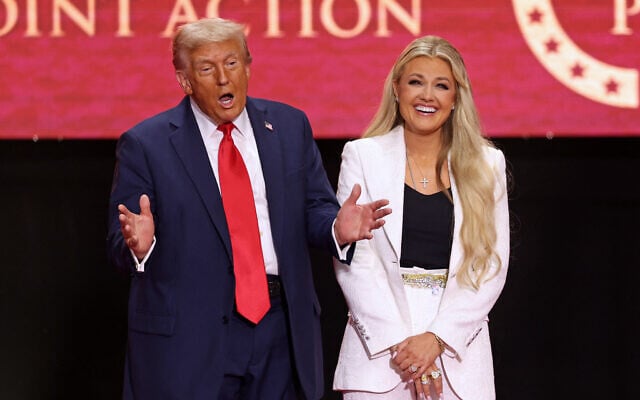US president also decries ‘radical left’ at service that draws more than 63,000 to honor slain conservative ‘giant’
Speakers highlighted Kirk’s profound faith and his strong belief that young conservatives need to get married, have children and pass on their values to keep building their movement.

They also repeatedly told conservative activists, sometimes in forceful tones, that the best way to honor Kirk was doubling down on his mission to move American politics further to the right.
“For Charlie, we will remember that it is better to stand on our feet defending the United States of America and defending the truth than it is to die on our knees,” Vance said. “My friends, for Charlie, we must remember that he is a hero to the United States of America. And he is a martyr for the Christian faith.”

Kirk’s assassination at a September 10 appearance on a Utah college campus has set off a fierce debate about violence, decency and free speech in an era of deep political division. The shooting has stirred fear among some Americans that Trump is trying to harness outrage over the killing as justification to suppress the voices of his critics and political opponents.
At one point, the president contrasted Kirk’s support for public debate — he often challenged students with opposing views to “prove me wrong” at college events — with his own scorched-earth politics.
“He did not hate his opponents,” Trump said. That’s where I disagreed with Charlie. I hate my opponents.”
Dozens of people, from journalists to teachers to late show host Jimmy Kimmel, have faced suspensions or lost their jobs as prominent conservative activists and administration officials target comments about Kirk that they deem offensive or celebratory. The retaliation has in turn ignited a debate over the First Amendment.

The service brought together a veritable who’s who of the Republican Party, with numerous current and former lawmakers in the crowd. Elon Musk, the tech billionaire and former top adviser to Trump, was spotted sitting with Trump for part of the service.
But the impact of Kirk’s assassination may have been most vividly demonstrated by the more than 63,000 regular people who filled the stadium to capacity to honor and mourn him. Many had driven or flown thousands of miles to be there.
People began lining up before dawn to secure a spot inside State Farm Stadium west of Phoenix, where Kirk’s Turning Point organization is based. Security was tight and speakers delivered their tributes from behind bulletproof glass.
The stadium quickly filled with people dressed in red, white and blue, as organizers suggested.

The mood in the stadium ebbed and flowed throughout a service that stretched more than five hours. Mourners were patient and cordial, even after waiting hours to enter and then an hour or more for food in stadium concession lines.
Cindy Warford, 62, said she and her 13- and 15-year-old granddaughters listened regularly to Kirk, who hosted a podcast in addition to speaking on college campuses. The girls have been hit particularly hard by his death, she said.
“I really feel this is this generation’s Martin Luther King or JFK or even 9/11 – that we lived through,” she said. “This has hit them really hard, because Charlie was talking to them.”
Warford was referring to the assassinations of Democratic President John F. Kennedy in 1963 and civil rights leader Martin Luther King Jr. in 1968, and the September 11, 2001, terror attacks in the US.
Those close to Kirk prayed and the floors at the home of the NFL’s Arizona Cardinals shook from the bass of Christian rock bands, as the memorial started with the feel of a megachurch service before veering into something more akin to a political rally.
Kirk’s widow, Erika, in her own address, said in the midst of her grie,f she was finding comfort that her husband left this world without regrets. She said she forgives the man who is charged with killing him.
“My husband, Charlie, he wanted to save young men, just like the one who took his life,” said Erika Kirk, who is taking over as Turning Point’s leader. She added, “I forgive him.”

A 22-year-old Utah man, Tyler Robinson, has been charged with killing Kirk and faces the death penalty if convicted of the most serious charges. Authorities have not revealed a clear motive in the shooting, but prosecutors say Robinson wrote in a text to his partner following the shooting that he “had enough” of Kirk’s hatred. Utah’s governor has said the suspect espoused a “leftist ideology.”
Some speakers at the memorial said Kirk was battling evil and referred to a vague “they” as the enemy. Others were blunt.
“You have no idea the dragon you have awakened, you have no idea how determined we will be to save this civilization, to save the West, to save this republic,” said White House deputy chief of staff Stephen Miller.
Kirk was a provocateur who at times made statements that some called racist, misogynistic, anti-immigrant and transphobic. That has drawn backlash from conservatives who view the criticism as cherry-picking a few select moments to insult the legacy of someone they see as an inspirational conservative leader.
Turning Point, the group Kirk founded to mobilize young Christian conservatives, became a multimillion-dollar operation under his leadership with enormous reach.
Speaker after speaker, including Defense Secretary Pete Hegseth and Secretary of State Marco Rubio, expressed awe at Kirk’s ability to go into what many conservatives saw as the lion’s den to make the conservative case: college campuses.“Why don’t you start somewhere easier,” Rubio recalled thinking when he first heard about Kirk years ago. “Like, for example, communist Cuba?”
Times of Israel staff contributed to this report.



